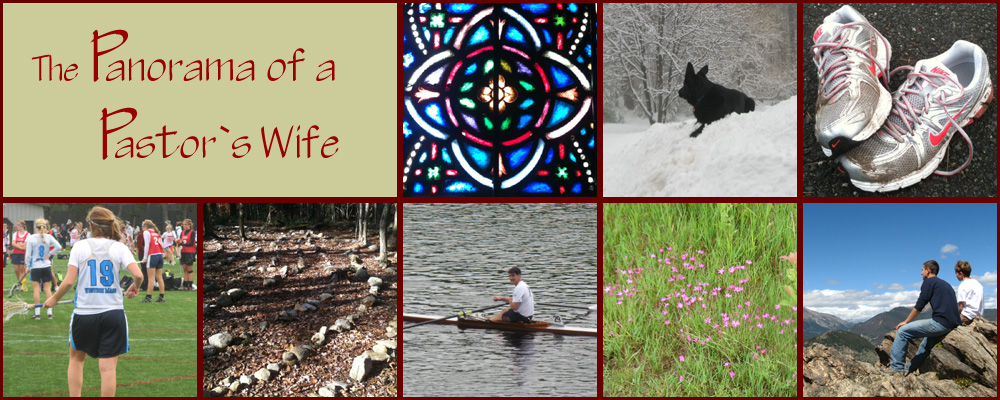Waiting Time
One day early in our marriage, I came back to our apartment in New Haven and found my husband sitting back in his desk chair, feet up on the desk, with a strange expression on his face. “What are you doing?” I asked. “Waiting for the Eschaton,” he replied. It was then that I realized I had some adjusting, or a whole lot of catching up, to do.
The Eschaton, as many of you no doubt already know and I had to learn, is the “End Time.” It is when everything is fully achieved, sorted out or (depending how you look at it) comes tumbling down. As far as I can tell, we haven’t gotten there yet, but my husband must have realized that all of this would take a long time and that he needed to get a few things done – like graduate from divinity school, become ordained and start his life as a priest, have children – in the interim.
Christians are in a more particular time of waiting now: the season of Advent. This is about anticipating something really amazing, the coming of Jesus. In his book The Shaking of the Foundations (1948), the famous theologian Paul Tillich took the idea and expanded it:
Our time is a time of waiting; waiting is its special destiny. And every time is a time of waiting, waiting for the breaking in of eternity. All time runs forward. All time, both history and in personal life, is expectation. Time itself is waiting, waiting not for another time, but for that which is eternal.
This is beautiful but surely also a conundrum. We are waiting for a time when time stretches endlessly ahead? Doesn’t more time bring mostly more waiting? Perhaps not, if we can feel at any one time that we are fully in that time and not dwelling on what has passed or longing for what may or may not come. This is tricky for us in regular life; maybe when we cross over into the land of eternity, however, we will be more at ease with every present moment and each one of them will be lovely.
It seems to me that the whole experience of waiting can take on different qualities: it can be full of expectation in a thrilling sense, or worrisome, or just boring and frustrating. In Keats’s magnificent poem, “Ode on a Grecian Urn” he describes the two lovers about to kiss, forever and ever frozen in that moment:
Fair youth, beneath the trees, thou canst not leave
Thy song, nor ever can those trees be bare;
Bold Lover, never, never canst thou kiss,
Though winning near the goal — yet, do not grieve;
She cannot fade, though thou hast not thy bliss,
For ever wilt thou love, and she be fair!
What he doesn’t say, but what most of us know, is that the kiss itself may bring a slight dip in emotion – it’s the anticipation of it that is the real treasure.
When we are waiting with some hope of good news but also plenty of fear for bad news, however, it’s a whole different story. There’s that awful lag between the taking of medical tests, for instance, and getting the results. It can feel like your whole life hangs in the balance. After a job interview, you have plenty of time to think back on how you did and convince yourself that you forgot to mention such-and-such or they must have spotted the glaring deficiencies in your background. Technology is causing some of this waiting time to disappear, at least in some academic tests. Just last week I took a long exam at a computer screen and my scores (except for those on the two essays) popped up immediately after I finished. Like them or not, there they were, preventing any further speculation.
Most of the waiting we do is probably somewhere in between these two kinds – it’s just tedious. Our two sons recently had a jam-packed couple of days in New York City; one of the last things they did was go to the Empire State Building. They joined hundreds of other people there in a line that snaked round and round every corner, culminating in a sardine-like experience on the elevator. One son advocated giving up and doing something else, the other argued the waiting wasn’t so bad compared to the view at the top. Afterwards, they were still of different minds about it.
Finding myself in an unanticipated line, I often get immediately restless and think about how I should have been smart enough to avoid it somehow. Of course the only good way to handle these times is to surrender to them, to have a book ready or enjoy the companionship of others around you. My kids think I do this way too much, but in certain circumstances it works pretty well. If the promise of the thing or person or experience you’re waiting for is not enough, then it helps to see the time itself as a gift.
The weight of a wait can be heavy and burdensome, or light and splendid. So much of life is lived in these passageways between one thing and another that we can hardly tell the beginning from the end; we mostly just know that we are still living.


If waiting in line in the supermarket isn’t spiritual practice, I don’t know what is.